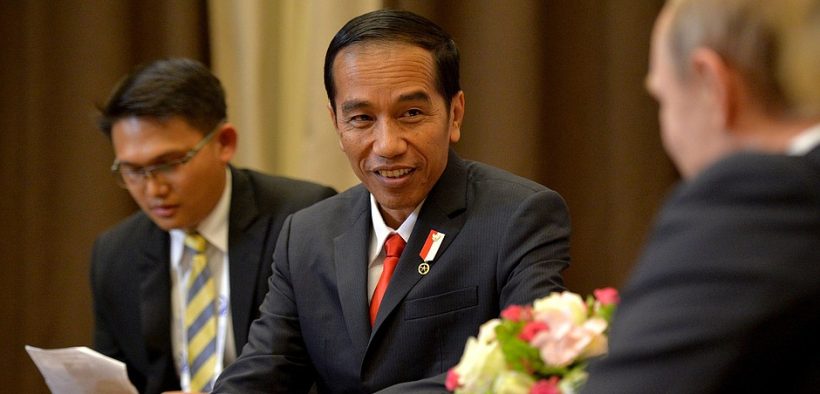Eight Dead in Jakarta Riot After Indonesian Election Results Announced

Indonesian police suspect paid “outsiders” instigated a riot following a protest over disappointment with Indonesia’s recent election results.
At least eight are dead and another 200 injured following Indonesian election protests held in front of the Election Supervisory Agency in Jakarta on Wednesday, May 22.
The protests came after Indonesia’s General Election Commission (KPU) announced on Tuesday the official results of the April 17 election, showing that the incumbent Joko Widodo (Jokowi) and his running mate Ma’ruf Amin won the election with 55.5 percent of the vote. Challenger Prabowo Subianto and his vice presidential candidate Sandiaga Uno won 44.5 percent, but the results lead to widespread violence, injuries and even deaths.
Thousands of people gathered in front of the Elections Supervisory Agency building, demanding the annulment of the Jokowi-Amin victory, citing an alleged electoral fraud.
According to Indonesian Police, the protesters held the rally peacefully at first, before “outsiders” instigated the riot. It is not exactly clear what group is responsible for inciting the riot but police claimed it was an organized group bent on violence. Head of Public Relations at the Indonesian Police Mohammad Iqbal said that most of the provocateurs came from outside of Jakarta.
As the situation escalated and turned violent, police officers tried to disperse the crowd using a water cannon and tear gas. Hundreds of demonstrators were seen throwing stones and Molotov cocktails towards police personnel, burning some vehicles, including the police cars.
The Jakarta police reached out to local respected religious figures to calm down the angry protesters, according to the Indonesian police’s public relations division.
The Government Temporarily Blocked Access to Social Media
In response, the Indonesian government decided to temporarily suspend access to social media to prevent the widespread distribution of false information related to the riot. Some social media users complained that they could not upload or download files from 3 p.m. and following on Wednesday.
According to the Minister of Communication and Informatics, Rudiantara, the blockage does not affect communication through short text messages (SMS) and voice calls.
“No problems with using voice call and SMS. What we have restricted are social media and messaging system. People use social media channels such as Facebook and Instagram to post images and videos, and those items always go viral on the messaging system or Whatsapp,” said the minister in a press conference related to the May 22 chaos on Wednesday.
The Indonesian Consumers’ Protection Foundation (YLKI) accepted the government’s action to block social media access, despite its potential violation of civil rights.
“Politically, the government’s action is understandable, even though it is late,” YLKI Head Tulus Abadi said in a short message received by Kompas.
With access to Instagram and Facebook blocked, Indonesians are turning to Telegram. The Russian-made messaging system has several user advantages – users can send encrypted messages and choose a broader range of stickers to express their emotions.
Who’s Behind the Indonesian Riot?
The Indonesian government claimed it has identified the mastermind behind the riot, but did not specify any details. The Jakarta police have named 300 suspects of the violent protest so far, as of May 23 at 8:31 p.m. Jakarta’s time.
The Indonesian police claimed they discovered evidence of who’s behind the planned attacks, evidence that includes Molotov cocktails, firecrackers, envelopes with money and a recording about the planned rally, said Head of Public Relations Division at the Jakarta Police, Argo Yuwono. The police are investigating who may have distributed money in the planning of the violent rally.
What’s Next For Indonesia Politically?
Subianto and Uno are expected to file a lawsuit at the Constitutional Court (MK) Friday afternoon on May 24 after Friday prayers. However, it will be an uphill challenge for the losing candidate to win his case in the court.
To prove that 17 million votes have been rigged, a candidate must provide evidence of 100 cases of fraud found at 100,000 to 200,000 polling stations.
It will be hard for Prabowo to prove the vote rigging allegation if he and his team are not well-prepared in compiling evidence, said legal expert Feri Amsari at the University of Andalas.
“Because it is complicated to prove there is a vote rigging. In 2014, the losing pair had to prove there were around 57,000 problematic polling stations, and it was not fulfilled. As we know, the court rejected the lawsuit,” added Amsari.
Some groups of protesters are planning to hold a rally on Friday, but the Indonesian police stated they have yet to receive permission for the protest.



















